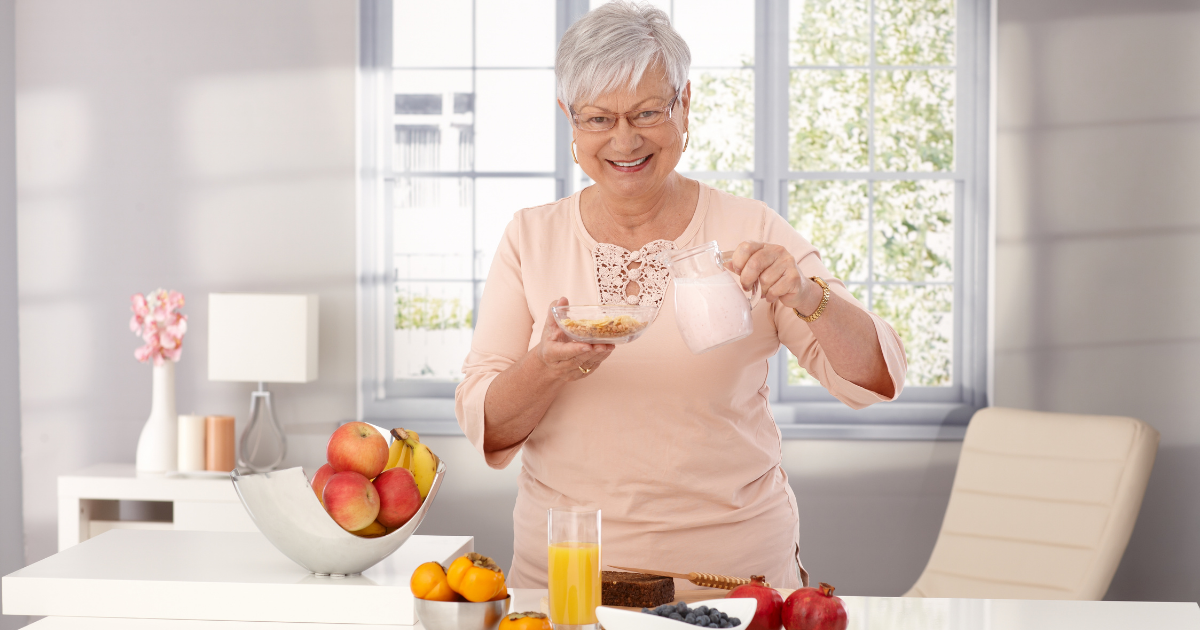As a senior age, meal planning and preparation can become increasingly challenging. They may suddenly find themselves living alone and unprepared to cook, they may have trouble getting around the kitchen, or they may not have as much money to spend on food as they once did. As they age, seniors’ bodies and lifestyles change, as does what they need to eat for healthy aging. Your loved one may need fewer calories, but getting enough of the right nutrients is more vital than ever.
How Eating Well Promotes Healthy Eating
Often, an aging adult’s food intake may decrease, and there may be a lack of variety in their diet. It can become increasingly difficult for them to summon the energy to have a healthy, balanced diet, and they may default to something quick and easy to prepare.
Having a nutritionally sound diet is essential to maintaining good health for a senior. In addition to giving them more energy and helping them control their weight, a healthy diet can also help prevent:
- Osteoporosis
- High Blood Pressure
- Heart Disease
- Type 2 Diabetes
- Prostate Cancer
- Colon Cancer
- Pancreatic Cancer
Proper nutrition and good health go hand-in-hand, especially for adults over 65.
5 Tips to Keep Your Senior Eating Healthy
Creating a diet plan for the senior in your life doesn’t have to be complicated. By incorporating these five simple tips, you can ensure that they’re eating healthy, nutritious meals.
Select Foods That Have a High Nutritional Value
Our metabolism slows as we age, and our bodies don’t need as many calories as they once did. The quality of the calories is more important than the quantity.
When meal planning, make sure your senior’s grocery list includes:
- Fruits
- Vegetables
- Whole grains (brown rice, oatmeal, corn, etc.)
- Whole wheat
- Non-fat or low-fat milk, almond or soy milk
- Nuts, beans, and seeds
- Lean meat, chicken, seafood, and eggs
Limit Empty Calories
Unfortunately, some of the most enjoyable items we eat don’t provide much nutritional value. They supply energy but very little nutrition in the way of vitamins, minerals, protein, fiber, or essential fatty acids. These fun foods include:
- Chips
- Baked Goods (brownies, cookies, cake, etc.)
- Soft Drinks (regular and diet)
- Candy
In addition to adding no value nutritionally, they often lead to weight gain. Have them be a treat, not a staple.
Drink 8 Glasses of Water per Day
Keeping your senior hydrated throughout the day is extremely important. Older adults typically don’t feel as thirsty as they did when younger and may not be reaching for water as often as they should. Avoid serving them alcohol, caffeine, or sugary drinks to keep them from becoming dehydrated. Instead, be sure they’re drinking eight 8-ounce glasses of water per day.
Keep Variety in the Diet
Everyone tires of eating the same things day after day. To keep your older adult interested in eating healthy, offer variety with their diet plan. Try to prepare foods with different colors and textures, such as a salad and carrots at the same meal. Give them options to choose from, which can prevent them from falling into a rut with their meal choices.
Keep Them Active
Keeping your seniors active doesn’t need to include strenuous physical activity they may not be capable of doing. Their appetite can be increased by the easy-to-do arm and leg exercises, walking outside or at the mall, or enjoying physical activities at a senior center. Physical activity will also increase their thirst, helping them to stay properly hydrated.
Meal Planning and Preparation by Seniors Prefer Homecare
Meal planning is one of the many services we offer seniors in the Huntsville and Tuscaloosa areas. Our caregiving team will customize a meal plan for your loved one that focuses on food selection, grocery shopping, and meal preparation. We understand how important a healthy diet is for seniors and their need to enjoy nutritious meals that suit their taste buds.
Give us a call today at (866) 417-1194. Our caring professionals will be happy to make sure your loved one’s nutritional needs are being met in the comfort of their own home.

